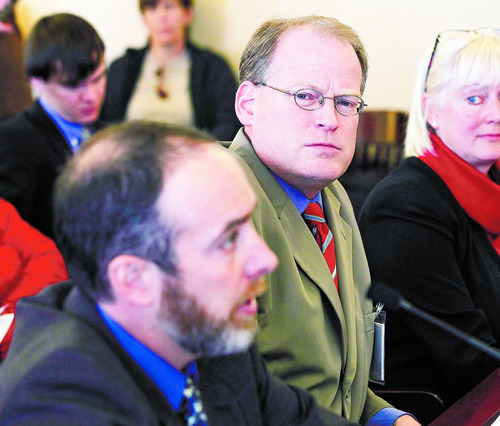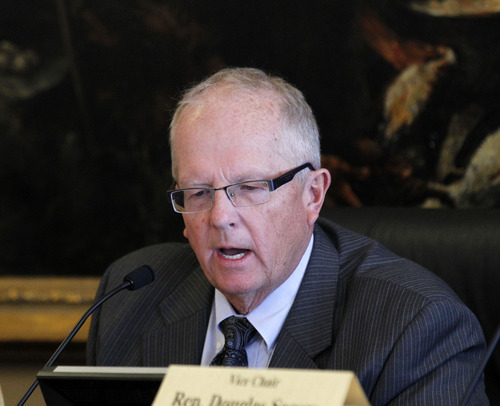This is an archived article that was published on sltrib.com in 2013, and information in the article may be outdated. It is provided only for personal research purposes and may not be reprinted.
The words "climate change" won't be added to Utah law, as HB77 would have directed. But supporters of the bill didn't leave a Capitol hearing room Monday totally defeated.
For the first time in the Legislature's history, it was people concerned about the impact of rapid global warming who held the floor for most of the two hours of sometimes emotional, sometimes fact-packed discussion before members of the House Committee on Natural Resources, Agriculture and Environment voted, 11-4, to kill the bill.
"This discussion is not going away — however long you are going to serve in the Legislature, representatives, it is not going to go away," promised sponsoring Rep. Kraig Powell, R-Heber City, who described it as a priority for his Republican constituents and a problem he's not exactly sure how to solve.
"What I do know in reading the data is that this is what is happening, and it's something we should be able to take recognition of in our statutes."
Powell's bill would have defined climate change as a human-caused phenomenon that is already causing bigger and more hazardous wildfires in Utah, and it gave land managers explicit approval to consider it — including the latest climate science — as they plan their fire containment strategy.
State lawmakers have not been silent on the subject. A few years ago, they invited University of Utah climate scientist Jim Steenburgh to present the latest data to the panel, alongside Roy Spencer, whose visit was funded by a climate skeptics group. Then, after lawmakers invited political scientist Christopher Monckton to debate the issue, Monckton wound up alone on a Utah County stage comparing his scientist critics at Brigham Young University to tyrants and Hitler.
Lawmakers even have voted on climate change. In 2010, they approved a resolution that called on the U.S. Environmental Protection Agency not to begin tallying greenhouse gas emissions "until a full and independent investigation of climate data and global warming science can be substantiated."
Gayle Ruzicka, president of the conservative Utah Eagle Forum, said her study of climate change on the Internet led her to conclude"everybody disagrees" that the changing climate poses serious risks. "I don't believe it should be in the code," she testified Monday.
Several of the bill's supporters, however, cited an American Geophysical Union study stating that 97.4 percent of climate scientists agree that human activity is contributing to rising global temperatures.
Meanwhile, Dick Buhler, director of the Utah Division of Forestry, Fire and State Lands, said he knew of nothing in state law that said climate change cannot be included in his agency's planning. In fact, he said, the organization already does factor climate change into its planning.
Last year, 1,453 wildfires in Utah burned nearly 500,000 acres. Fighting the fires cost an estimated $50 million, and Utah taxpayers paid $16 million of that, the bill's advocates have said, citing statistics from the state lands office.
Ruzicka was among the three people who testified against the bill. Meanwhile, more than a dozen of the 100 members of the public who attended Monday's hearing voiced support.
Westminster College senior and Powell constituent Lauren Johnson told about her deep roots in the state that go back to pioneer times. Climate change, she said, makes her worried for Utah's future. She pointed to data showing Utah is heating up faster than the rest of the world. She urged lawmakers to consider what they would do if a 5-year-old daughter ran a few-degrees fever for weeks and only got worse.
"You would do anything possible to make it better because she is your child," she said,"and she's irreplaceable."
Twitter: @judyfutah







